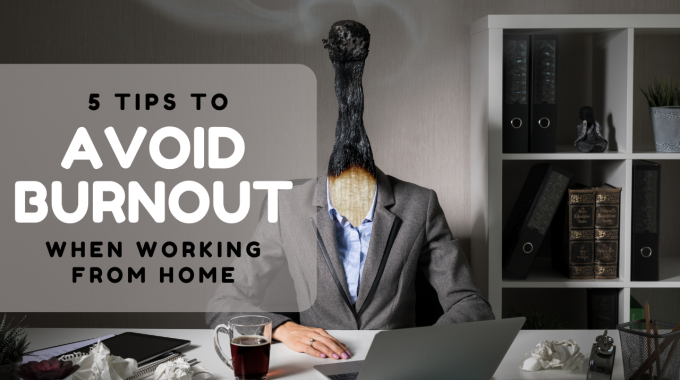As online teachers and tutors, we heavily rely on Zoom to teach and connect with…

5 Tips to Avoid Burnout When Working from Home
Are you ‘working from home’ or ‘living at work’? This is a question all remote workers have to ask themselves at some point. The line between work and personal life has become ever so blurry as more jobs are turning remote due to the pandemic. Although working from home has its benefits, many people across the globe are experiencing virtual burnout because work and home life are slowly meshing into one.
Burnout has detrimental effects to both mental and physical health. Some common symptoms to look out for are insomnia, changes in diet, mental/physical fatigue, irritation, low productivity, difficulty focusing and forgetfulness. If you are experiencing a few or all of these symptoms, try these tips to help you avoid reaching full burnout.
1) Stick to a work schedule and set your boundaries.

Making a clear distinction between work life and personal life is key when working from home. Studies have found that remote employees actually work an hour more on average per day than they did in pre-pandemic times.
If you’re meant to be done with work at 5pm, stop working at 5pm. Make a work schedule and stick to it or else work will seep into every area of your life. Your work will always be there, but your time, your family and your good health might not be.
By separating your business and personal hours, you are setting a clear, reasonable boundary between them. If you don’t set these boundaries, there won’t be any. And if your boss or colleagues make you feel bad about setting boundaries, that’s why they exist in the first place.
2) Unplug from technology.
Just as your laptop and phone batteries are being drained throughout the day, so are you. Take time to recharge your own batteries by spending some time away from technology and doing something you love.
You can read a book, work on a side project, listen to a podcast or anything really. The important part is to get your eyes off a screen and to have some time just for yourself, where no one is bothering you and pulling you in a hundred different directions.
3) Make a to-do list and prioritize.

When working from home, the to-do list can seem endless as work tasks are mixed with home tasks and as soon as one thing finishes, two more are added. The key to making an effective to-do list is to prioritize the items on the list.
The night before or the morning of, write a list of all the things you need to get done that day and ask yourself which 2-3 tasks are absolutely necessary and which ones you can leave for another day. Complete the most important tasks first (these are probably the ones you’ve been avoiding) and the rest of your day will be much easier. If you don’t get your most important tasks done, there will be a looming cloud over your head until they’re finished and that can be a strain on your mental health.
4) Get some fresh air and move your body.
Fresh air and exercise can significantly improve your mood and productivity. The sedentary life in front of a computer screen is not healthy at all and it should be no surprise that people are moving a lot less when working from home.
To avoid cabin fever, take a walk outside and give your brain some fresh oxygen. This will boost your creativity and productivity. You can do some simple exercises at home as well by following some Youtube videos or using work out phone applications. You don’t need to do a lot, but doing just a little can make a big difference.
5) Take a day off when needed.

Sometimes we all just need a break. Taking a day off once in a while is not lazy, it’s self-care. You may have accumulated vacation days from work that you hardly touched during the pandemic because you were working from home, but sometimes it’s just nice to take a day off and chill or do activities you normally don’t have time for.
If you don’t have vacation days and can afford to take a few unpaid days off, take them – but use them properly. Don’t be thinking about work and all the things you need to get done. Go visit a new place, catch up with friends or family and disconnect your mind from your job. You’ll even notice that when you’re back to work, you will be many times more productive because you’ve given your mind and body the proper rest it needs.
“Burnout is not a badge of honor”, says Greg McKeown in his new book, Effortless. Learn to take care of yourself and balance your work and personal life. Time and energy are your most valuable assets. Allocate them wisely and you will avoid experiencing burnout.
We hope you enjoyed this article and found it helpful. If you have other tips for avoiding burnout when working from home, share them in the comments below!



